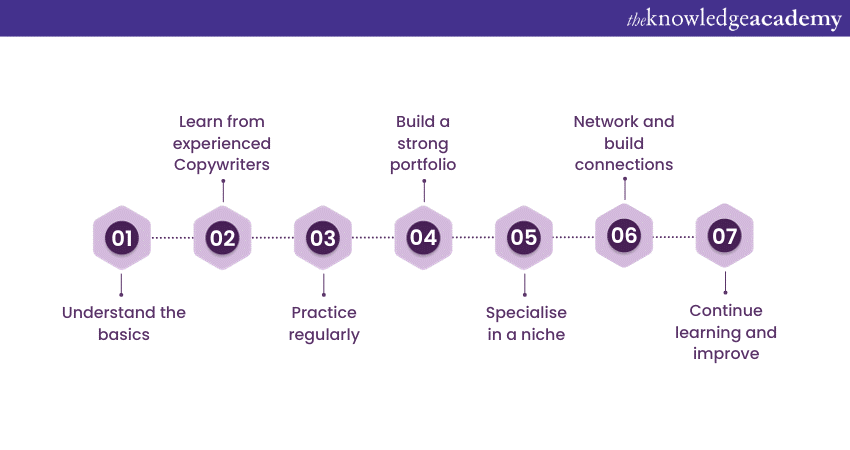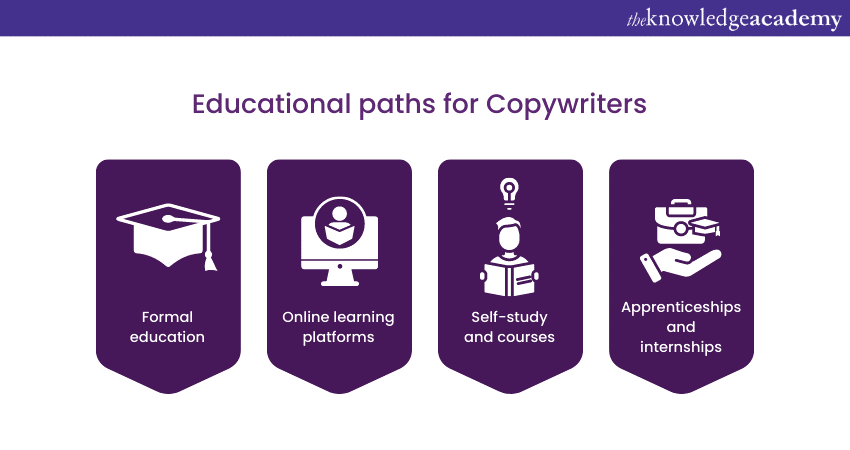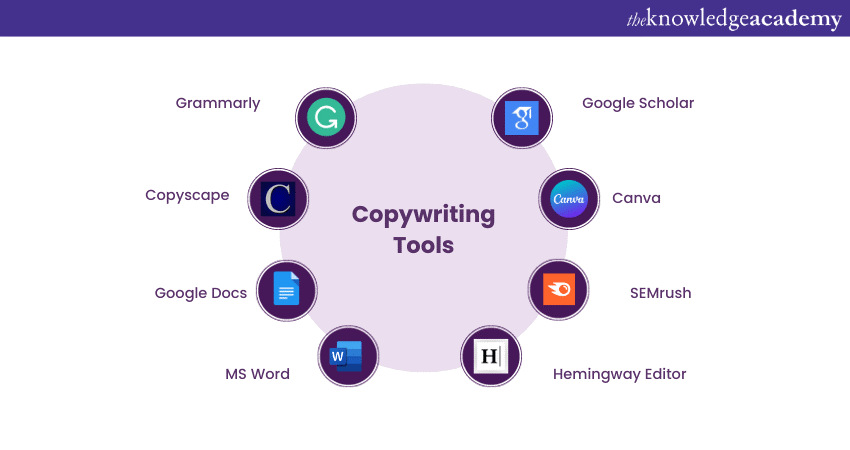We may not have the course you’re looking for. If you enquire or give us a call on 01344203999 and speak to our training experts, we may still be able to help with your training requirements.
Training Outcomes Within Your Budget!
We ensure quality, budget-alignment, and timely delivery by our expert instructors.

Every business, every product, every idea has a story to tell. Copywriters have the knack for turning these stories into engaging narratives that not only inform but also inspire. This skill is the driving force behind successful marketing campaigns and effective brand communication.
According to Nielsen Norman Group, only a mere 20% of a page's content is consumed by readers. This highlights the importance of effective Copywriting as they have the ability to attract potential readers at just a glance.
If you are wondering How to Become a Copywriter, then this blog is for you. Becoming a good Copywriter is a journey that involves mastering the art of persuasive writing and effectively communicating messages to target audiences. This comprehensive blog will walk you through the essential steps on How to Become a Copywriter and provide helpful tips for becoming a better Copywriter.
Table of Contents
1) What is Copywriting?
2) Skills required to become a Copywriter
3) How to Become a Copywriter?
4) Building a Copywriting career
5) Educational paths for Copywriters
6) Must-know tools for Copywriters
7) Conclusion
What is Copywriting?
Before we dive into the steps for becoming a Copywriter, let's understand what Copywriting is. Copywriting is the strategic process of crafting written content, known as "copy," intending to promote a product, service, idea, or brand. Copywriters use their creativity and linguistic skills to produce content that resonates with the target audience and motivates them to take desired actions, such as making a purchase, signing up for a newsletter, or clicking a link.
A successful Copywriter understands the nuances of various industries and markets, tailoring their content to suit the preferences and needs of different target audiences. They possess a deep understanding of consumer psychology, allowing them to craft content that appeals to emotions, aspirations, and pain points.
Copywriting is not limited to any specific medium. It spans various platforms, including print advertisements, website copy, social media posts, email campaigns, video scripts, and more. Each medium demands its own unique approach, requiring Copywriters to be versatile and adaptable in their writing style.
Elevate your Copywriting skills with the Web and Email Copywriting Masterclass - Join now and craft compelling content that converts.
Skills required to become a Copywriter
To excel as a Copywriter, you need to develop a range of skills that go beyond just writing. Here are some essential skills to focus on:
1) Persuasive writing skills
One of the core goals of Copywriting is persuasion. A skilled Copywriter knows how to leverage persuasive techniques to influence readers' decisions. This might involve using emotional appeals, employing storytelling, highlighting benefits, and addressing objections. Crafting compelling arguments that resonate with the reader's desires and needs is a hallmark of effective Copywriting.
2) Creativity and imagination
Copywriting demands creativity in abundance. Whether you're crafting a compelling headline, brainstorming unique angles for a product description, or developing an innovative campaign concept, a creative mind is your greatest asset. The ability to think outside the box and generate fresh ideas is what sets exceptional Copywriters apart.
3) Research and adaptability
In the field of Copywriting, every project is an opportunity to become an expert in a new subject. Thorough research is essential to understand the nuances of the product, service, or industry you're writing about. Adaptability comes into play as you translate complex information into clear, concise, and engaging content that resonates with your target audience.
4) Attention to detail
Copywriters must pay careful attention to detail to ensure accuracy and consistency in their work. This involves proofreading for grammar and spelling errors and fact-checking and verifying information. Small mistakes can erode credibility and undermine the effectiveness of your message.
Adapting to different tones and voices
Copywriters often work with various clients and brands, each with its unique tone and voice. Adapting your writing style to match the brand's personality is essential for creating consistent and authentic messaging. Whether it's a formal, corporate tone or a playful and casual voice, skilled Copywriters can flexibly adapt their writing to suit the context.
How to Become a Copywriter?
Here’s a step-by-step guide on how to become a better Copywriter:

Step 1: Understand the basics
Mastering the basics of Copywriting lays a strong foundation for your career growth. Familiarise yourself with the key elements of compelling copy, including attention-grabbing headlines, engaging taglines, persuasive body copy, and effective Calls to Action (CTA). Study different Copywriting styles, such as long-form and short-form copy and understand how each style caters to different objectives.
Step 2: Learn from experienced Copywriters
Learning from established Copywriters is an excellent way to gain practical insights. Analyse successful campaigns, advertisements, and marketing materials created by experienced professionals. Pay attention to their language, tone, use of emotion, and the techniques they employ to capture and maintain readers' attention. This analysis can provide valuable inspiration for your work.
Step 3: Practice regularly
As with any skill, practice makes perfect. Dedicate time each day to writing exercises, prompts, and challenges. Experiment with different tones, styles, and formats to broaden your skills. Additionally, create imaginary scenarios and write copy for them to hone your ability to adapt to various contexts. The more you practice, the more confident and versatile you'll become as a Copywriter.
Step 4: Build a strong portfolio
A portfolio is your showcase to potential clients or employers. Collect a diverse range of your best Copywriting samples, including real-world projects, personal writing exercises, and speculative pieces. Your portfolio should highlight your ability to adapt to different industries, writing styles, and mediums. As you gain experience, regularly update your portfolio to reflect your growth and evolving skillset.
Step 5: Specialise in a niche
While versatility is valuable, specialising in a niche can set you apart and make you an expert in that area. Whether it's technology, fashion, healthcare, or finance, choose a niche that aligns with your interests and expertise. Good knowledge of your chosen niche allows you to create targeted, relevant, and impactful copy that resonates with your audience.
Step 6: Networking and building connections
Networking is essential in the Copywriting industry. Attend workshops, conferences, and industry events to connect with fellow Copywriters, Marketers, and potential clients. Building relationships can lead to collaborative opportunities, referrals, and exposure to different perspectives. Join online Copywriting forums and social media groups to stay engaged and updated within the community.
Step 7: Continuous learning and improvement
Copywriting is an ever-evolving field with constantly changing trends, techniques, and technologies. Invest in your education by attending webinars, workshops, and courses focusing on advanced Copywriting strategies, the psychology of persuasion, and marketing trends. Stay updated with industry news and blogs to adapt your skills to the latest developments.
Building a Copywriting career
Once you are ready with the skills and portfolio, it's time to move to the next step. Here’s the best way to build your Copywriting career.
1) Freelancing vs. in-house positions
There are multiple ways to build a Copywriting career. Some Copywriters prefer to work as freelancers, while others are full-time professionals.
a) Freelancing: Many Copywriters begin their careers as freelancers. Freelancing offers flexibility in terms of work hours and projects. You can choose your clients, rates, and work environment. However, freelancers must also manage their business operations, including finding clients, setting rates, and handling administrative tasks.
b) In-House positions: In-house Copywriters work as part of a marketing or creative team within a company. These roles offer stability, a consistent workflow, and the chance to work closely with other professionals. However, they may have less creative freedom compared to freelancers.
2) Setting your rates
Determining your rates as a Copywriter can be challenging, especially when starting. Research industry standards and consider factors like your experience, the project's complexity, and the client's budget. It's crucial to strike a balance between charging what you're worth and remaining competitive in the market. You can gradually increase your rates as you gain experience and build a strong portfolio.
3) Finding clients
Finding clients is a crucial aspect of a Copywriting career. It can be done by:
a) Networking: Attend industry events, workshops, and online forums to connect with potential clients. Building relationships can lead to referrals and collaborations.
b) Online platforms: Join freelance marketplaces, such as Upwork, Freelancer, and Fiverr, to showcase your skills and connect with clients seeking Copywriting services.
c) Cold pitching: Research companies that align with your niche and pitch your services directly to them. Personalised pitches that demonstrate an understanding of their needs can be effective.
d) Content marketing: Create a blog or contribute articles to establish your expertise. This can attract potential clients who are impressed by your writing skills.

4) Managing projects and deadlines
Effective Project Management ensures that your projects are delivered on time and meet client expectations. Other important factors to consider for managing projects and deadlines are:
a) Communication: Clearly communicate with clients to understand their requirements, expectations, and deadlines. Regular updates ensure that everyone is on the same page.
b) Time management: Utilise tools like calendars, project management software, or task lists to prioritise and manage your workload efficiently.
c) Prioritisation: Learn to prioritise tasks based on urgency and importance. This helps you manage multiple projects simultaneously.
d) Feedback and revisions: Be open to feedback and willing to revise your work based on client input. Collaboration is key to delivering high-quality copy.
5) Developing a brand
As a Copywriter, you're not just selling your writing skills – you're also selling yourself. Develop a personal brand that reflects your style, values, and expertise. This can help you stand out in a competitive market. Your brand should be consistent across your portfolio, website, social media profiles, and any other online presence.
Educational paths for Copywriters
Aspiring Copywriters have a multitude of educational avenues to choose from, each offering unique benefits and opportunities for skill development. Whether you're seeking formal education, looking for online courses, or prefer self-study, there's a path that suits your learning style and career goals.

1) Formal education (Degrees and Courses)
Formal education is just a regular degree. It includes:
a) Bachelor's degree in communications, marketing, or english: Pursuing a degree in these fields provides a comprehensive education in writing, communication strategies, and marketing principles. A formal degree can offer a strong foundation for your Copywriting journey and may open doors to various roles in the marketing industry.
b) Master's degree in marketing or literature: For those aiming for more advanced positions or specialisations, a master's degree can offer in-depth knowledge and advanced writing techniques. Programs often include courses in content strategy, persuasive writing, and branding.
c) Specialised Copywriting courses: Many universities and colleges offer specialised courses focused solely on Copywriting. These courses dive deep into the art of persuasive writing, crafting effective headlines, and understanding consumer behaviour.
2) Online learning platforms
Online learning has become very common these days. Individuals turn to online courses in different niches to upskill themselves and advance their careers. You can also look for expert-led or self-paced online courses on Copywriting that offer certifications. You can use these certifications further to showcase your skills in today’s competitive job market.
3) Self-study and resources
Self-study is the best way to start your career as a Copywriter. You can begin with:
a) Books on Copywriting: There's a wealth of literature on Copywriting that covers writing techniques, the psychology of persuasion, and crafting compelling marketing messages. Recommended reads include "Hey, Whipple, Squeeze This" by Luke Sullivan and "The Copywriter's Handbook" by Robert W. Bly.
b) Blogs and online resources: Many experienced Copywriters and marketing professionals share their insights and tips through blogs and online articles. Websites like Copyblogger and Neil Patel's blog provide valuable advice for aspiring Copywriters.
c) Copywriting communities: Joining online forums, social media groups, and Copywriting communities allows you to engage with fellow writers, share experiences, and learn from one another.
4) Apprenticeships and internships
Consider interning with advertising agencies, marketing firms, or even established freelance Copywriters. The hands-on experience offers a practical understanding of the industry, exposes you to real client projects, and helps you build a network.
Must-know Tools for Copywriters
There are tons of tools that Copywriters use. Some of the common tools are:

1) Grammar and spell-checking tools: Grammarly, ProWritingAid
2) Plagiarism checkers: Copyscape, Grammarly Plagiarism checker
3) Writing and editing software: Microsoft Word, Google Docs, Scrivener and Hemingway Editor
4) Keyword research tools: Google Keyword Planner and SEMrush
5) Graphic design tools: Canva and Adobe Spark
60 Reference and research tools: Google scholar, Thesaurus.com
Conclusion
Becoming a successful Copywriter requires dedication, continuous learning, and a passion for words. It’s a lucrative career choice in 2023 and beyond. Further, we hope this blog covered all the information on How to Become a Copywriter. By mastering essential skills and following the steps outlined in this blog, you can build a rewarding career in Copywriting.
Elevate your Copywriting skills with our Copywriting Masterclass and unleash the power of words in the digital world.
Frequently Asked Questions
Upcoming Digital Marketing Resources Batches & Dates
Date
 Digital Marketing Course
Digital Marketing Course
Fri 24th Jan 2025
Fri 28th Mar 2025
Fri 23rd May 2025
Fri 25th Jul 2025
Fri 26th Sep 2025
Fri 28th Nov 2025







 Top Rated Course
Top Rated Course


 If you wish to make any changes to your course, please
If you wish to make any changes to your course, please


